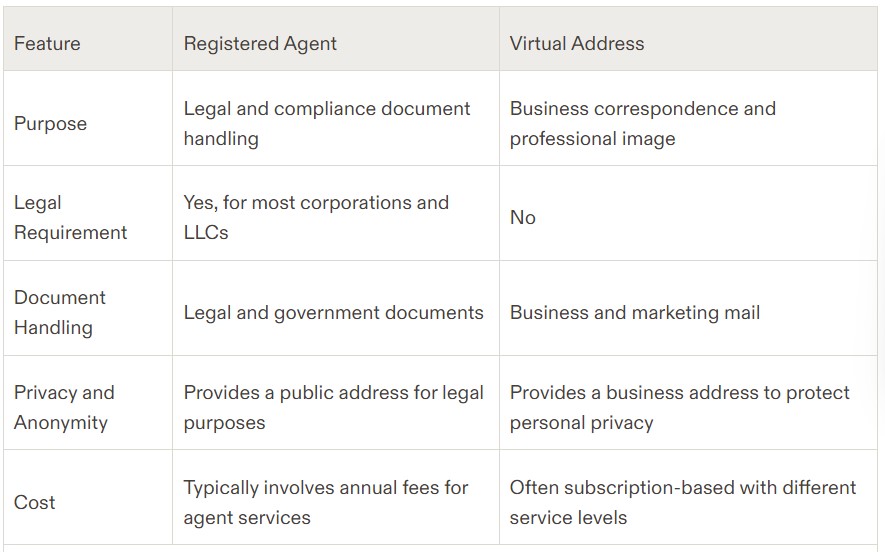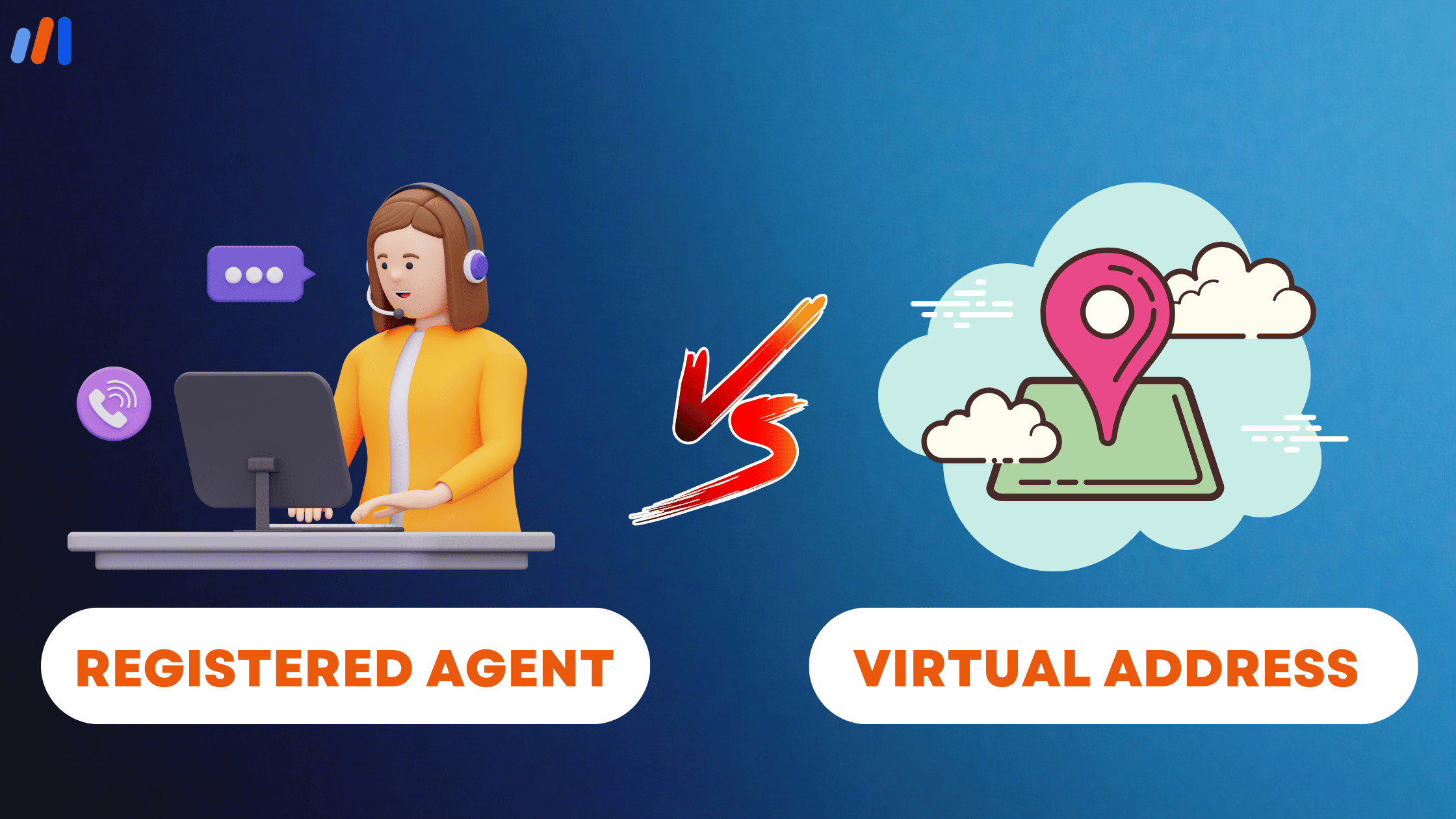Understanding the conflict of interest between Registered Agents and Virtual Addresses is beneficial when one is establishing a business in the USA. Although both are necessary to maintain proper organization and compliance to carry out business operations, the two terms are frequently misinterpreted.
While a Registered Agent is required by law to get papers and regulatory bodies, a Virtual Address is best described as a pragmatic means of receiving mail targeted towards a business that does not require an actual physical premise.
In this guide, we’ll break down the key differences, benefits, and how to choose the right option for your business needs.
What is a Registered Agent?
A registered agent is either a person or a business who is officially appointed to receive certain types of documents and legal notifications on behalf of the firm. This task is very important for businesses situated in the USA and to LLCs, organizations, and other formal entities. A registered agent performs the service of letting the business know of such events affecting the business as lawsuits, tax notices, and state filings that require the business to be operational.
Key responsibilities of a Registered Agent include:
1. Receiving legal documents: The registered agent receives legal papers, which for example include service of process, when they relate to a lawsuit in which the company is a party.
2. Receiving government correspondence: A registered agent will be responsible for receiving letters such as analysis reports on an annual basis, tax notice forms, or reminders of the due date.
3. Forwarding documents to the business: Upon receipt of documents, the agent forwards the necessary ones to the business for prompt action.
It is requisite in all the states that the businesses appoint a registered agent who is a person residing in the state where the company is incorporated or where it has the primary place of business. The agent should be resident within the state and should have a regular business address and not a P.O. box.
That function enables businesses to keep their compliance with the state law in good standards since the businesses will not fail to receive essential compliance documents.
What is a Virtual Address?
A virtual address is the second address that allows businesses to receive mail even if they do not have a physical office. Small businesses, freelancers, startups, and remote companies can benefit from having a virtual address to maintain a professional image there’s no need to establish physical office premises. Such addresses can also be used to obtain a business identity in a specific region or well-established cities.
Key features of a Virtual Address include:
1. Mail handling: Businesses that require mail forwarding services are also provided with a package that includes the storage/collection, scanning, and forwarding of the packages to the address required by the business owner.
2. Physical address: Even if the service is described to be ‘virtual’, the address given has to be a bona fide physical address that is not a P.O. Box and can be used for business communications, advertising, and receiving official correspondence.
3. Business presence: A virtual address will allow the owners to create their businesses in another province or city which may be helpful in marketing, entry into localized markets, or for confidentiality purposes.
4. Privacy protection: Virtual addresses will be beneficial especially for owners of home-based businesses as they ensure that the owner’s home address does not appear on documents or directories.
5. Mobility: It helps businesses operate from wherever as it allows business owners not to be located at the specific site to receive mail or manage that actual site.
It is common in the USA that a virtual address is used for dealing with mail and for business registration purposes in states where the business should not necessarily take a physical address. But a virtual address, unlike Registered Agents, is not required by law to act in service of process or any legal papers unless directed to do so.
Key Differences between Registered Agents and Virtual Addresses

Here are the key differences between a Registered Agent and a Virtual Address:
1. Purpose
Registered Agent: Its role is mainly for legal and compliance purposes. It is a requirement for LLCs, corporations, as well as any formal business enterprise, to have a business that will receive legal documents (such as lawsuits or notices of compliance to the state) on behalf of the business.
Virtual Address: A virtual address is mostly most that acts as a legal address for any correspondence like mails. Rule Legal F Void Long A virtual address with mailing capabilities is not a good way of getting legal documents as it is not an address where legal documents can be served.
2. Legal Necessity
Legal Requirement: The address that serves as the domicile of record for a business and must be maintained in the country, state, or administrative subdivision where the organization is registered. It is now common for a business to have a registered agent who is licensed to conduct business in the state of incorporation of the business.
Virtual Address: Not a legal requirement. It is optional and used for convenience, privacy, or projecting a professional business image.
3. Mail Types Handled
Legal Requirement: legal documents that include articles, a certificate of incorporation, and business license, administrative subordination business-respectingly. Legal documents with a registered address will be focused on notifications of early violations and offers from solicitors.
Virtual Address: The document will be restricted as areas are primarily looking at business-operated addresses. The virtual mailbox however does easily handle any form of communication, packages, or other documentation.
4. Privacy
Registered Agent: His registered agent will indeed provide a legal address, however, that address might still not be private for business owners as there are chances that such information is present in a wider repository.
Virtual Address: For the working proprietor, a virtual address is useful as it avoids placing his address on record for businesses and environments.
5. Services Offered
Registered Agent: Here, the primary focus is to comply with the legal requirements of receiving legal documents. Some of the functions provided by registered agents relate to compliance and other business options their clients require.
Virtual Address: Affords client’s options such as mail forwarding, scanning, emails, and updates on packages received, and if the company providing the service happens to provide board rooms or desk space, all that is also accessible.
6. Location requirements
Registered Agent: A business address must be provided in the state in which a particular firm is registered. A PO box is out of the question in this case.
Virtual Address: For a virtual address, there is no functional requirement on which state, or which city, the address is reached in connection to how the owner of the business intends the address to be. It is not a requirement that a business occupies a certain location but the branding of the business entity pursues this end.
7. Business Formation’s Context
Registered agent: A registered agent is essential when an LLC or a corporation is formed because the states want to know who is directed to accept legal notices and documents concerning or on behalf of the business.
Virtual address: Opening a business website or creating business marketing materials or business cards with this address is optional for business formation.

Pros and Cons of Using a Registered Agent
Pros of Using a Registered Agent
1. Legal Compliance
State rules adhered to: There would be no cause for concern since only a registered agent will take the responsibility of receiving and managing all crucial legal documentation like lawsuits, tax notices, and annual reports and filing them upon lapsed deadlines. Missing such documents may lead to penalties, fines, or even loss of business standing.
2. Privacy protection
Provides a private address: Where a registered business is run from home or simply an office address listed on the government records is unavailability, the registered agent will enable such businesses to have a legal address without exposing any personnel or business address.
3. Business Flexibility
Physical presence is not required: You will not have to be seated at your business address within the normal working hours of the business. The registered agent has to be accessible to obtain important documents, leaving you to operate your business anywhere.
4. Compliance in Different Jurisdictions
Assists with operations across borders: If your company conducts its business in different regions, it will be necessary for you to get a registered agent in every state in which you conduct business. Registered agent services simplify meeting this requirement by eliminating the need to establish real estate in every state in which business is done.
5. Professional Management
Documents are well managed by experts: Several professional registered agent services enhance their services with additional features such as compliance notifications, document scanning, and forwarding, as well as reminder services for annual report filing. This assists companies in fulfilling their legal requirements without missing significant deadlines.
6. Relief
Avoid the risk of missing legal documents: An effective registered agent guarantees the adequate and prompt management of legal notices. This eliminates the risk of legal sanctions or even default orders when one is unable to attend to a lawsuit or government notification.
Cons of Using a Registered Agent
1. Cost
Extra cost: the third-party registered agent service requires an additional expenditure that is, on average, between $50 and $300 each year. This amount of money is insignificant when dealing with big businesses, however, it can be seen as unnecessary for small businesses or startups that are on a budget.
2. Limited Scope of Service
Concentrate on legal and compliance mail: Registered agents often take care of legal papers but do not deal with other business correspondence. If you are in search of a service to take care of the legal as well as college correspondence, a registered agent will not suffice unless it is supplemented by a virtual office service.
3. Loss of Control
Reduced direct control on legal documents: If you are making use of a third-party agent, the legal documents are first delivered to the agent and later sent to you. This may cause you to miss out on the first contact with vital documents as you have to wait for the agent to call you up which on rare occasions may take longer, however, most of them are quite fast in these matters.
4. State-Specific Address Requirement
Have to have a local address in each of the areas: For businesses that are within the United States with many operations, you will be required to employ a registered agent with a permanent address in that location. Although operating such services will make it easy, it makes multi-state operations more challenging in terms of compliance.
Pros and Cons of Using a Virtual Address

Pros of Using a Virtual Address
1. Professional Business Image
First, let us consider one’s address: There are business centers or cities that offer a virtual address with a physical presence. However, to a freelance business, a virtual address can add to the firm’s credibility, especially for self-starters seeking to enter a competition.
2. Privacy Protection
A business virtual address assists with protecting sensitive details: A virtual address helps keep an individual harbor or personal address unlisted and off business records and databases for small home-run businesses with no actual office, thereby ensuring confidentiality.
3. Location Flexibility
Such a setup allows a business specialist to engage with associates without any hindrances, ‘work and live where you want.’ It benefits even more the remote workers, the freelancers, and the companies with overseas operation teams.
4. Mail Handling Services
Convenient: Most of these options include mail handed services as well as other time-saving features such as scheduling pages, listening to messages, notifications for incoming mail, etc. All, it allows affecting mail posting from any location and without its receiving in person.
5. Adherence to the Laws of Business Registration
Business registration: A few states demand a permanent mailing address during incorporation. This can be avoided by having the business registered at a virtual address.
6. Affordable Option for Leasing an Office Space
Reduced costs: Getting a virtual address is much cheaper than getting an office space. This is suitable for businesses that do not require an office but would like to have a formal address.
7. Encourages Growth
Presence in more than one location: The use of virtual addresses at different locations allows one to have a virtual location in various other cities or even other countries. This is useful in enhancing market growth, enhancement of the brand, and building new customers’ confidence in the areas.
Cons of Using a Virtual Address
1. Minimal Expansion Through The Physical Setting
No physical office: A virtual address offers a physical address but not a real office. In case you want to have a center where you can meet your clients or work, other alternatives like coworking spaces should be sought which can be expensive.
2. Not Appropriate For That Purpose
Not a substitute for a registered agent: Lawsuits and state compliance documents are typically not sent to virtual addresses. A registered agent would still be required to manage papers and compliance.
3. Should Not Expect Timely Responses
Delay in receiving letter: Since your package is sent to the virtual address provider first, it always takes time for you to get your package or letters depending on how fast the service provider is in forwarding it to you.
4. Expenses Can Be Significant
Extra charges: Basic mail forwarding or scanning services are usually part of the package, but the forwarding of packages or even scanning a large number of mail can prove to be expensive. These costs may build up, especially in the instance where the business practices regular correspondence through mail.
5. Restrictions Imposed By Law
Not always acceptable for certain business registration: A virtual address may not be accepted in every state or region for registering or licensing an official business. Some locations, for example, do not allow a virtual address because a physical location is needed for compliance or legal issues.
Get a Registered Agent or Virtual Address with Easyfiling
Both registered agent and virtual address have their unique benefits for the business, even after a thorough comparison between Registered Agents and Virtual Addresses. Well, whether you need a registered agent or a virtual address, Easyfiling has got you covered.
Schedule a free consultation and find out where we could assist you with registering your agent and virtual address.
File Your LLC Today
25$ off with a coupon
Lock in EasyFiling's transparent rates and get lifetime compliance support at no extra cost.
Get Started Now







